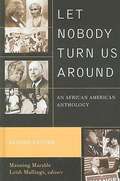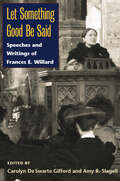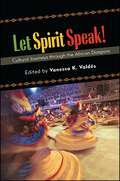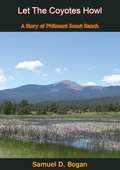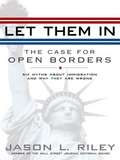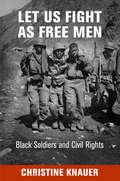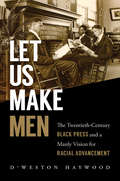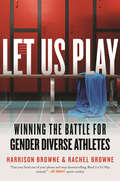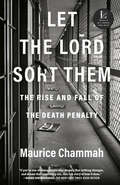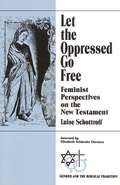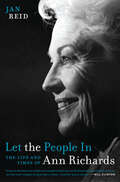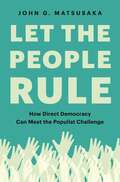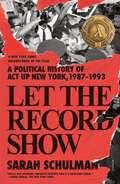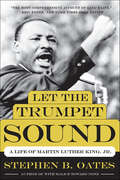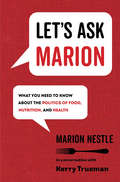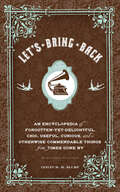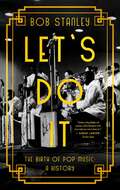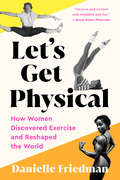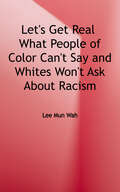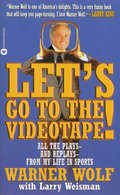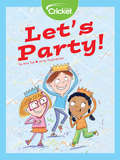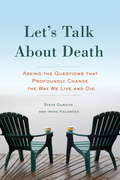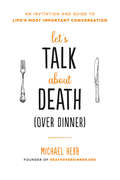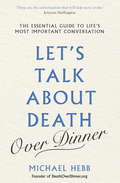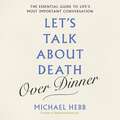- Table View
- List View
Let Nobody Turn Us Around: An African American Anthology (Second Edition)
by Manning Marable Leith MullingsThis anthology of black writers traces the evolution of African-American perspectives throughout American history, from the early years of slavery to the end of the twentieth century. The essays, manifestos, interviews, and documents assembled here, contextualized with critical commentaries from Marable and Mullings, introduce the reader to the character and important controversies of each period of black history. The selections represent a broad spectrum of ideology. Conservative, radical, nationalistic, and integrationist approaches can be found in almost every period, yet there have been striking shifts in the evolution of social thought and activism. The editors judiciously illustrate how both continuity and change affected the African-American community in terms of its internal divisions, class structure, migration, social problems, leadership, and protest movements. They also show how gender, spirituality, literature, music, and connections to Africa and the Caribbean played a prominent role in black life and history.
Let Something Good Be Said: Speeches and Writings of Frances E. Willard
by Frances E. WillardThe definitive collection of speeches and writings of one of America's most important social reformers Celebrated as the most famous woman in America at the time of her death in 1898, Frances E. Willard was a leading nineteenth-century American temperance and women's rights reformer and a powerful orator. President of Evanston College for Ladies (before it merged with Northwestern University) and then professor of rhetoric and aesthetics and the first dean of women at Northwestern, Willard is best known for leading the Woman's Christian Temperance Union (WCTU), America's largest women's organization. The WCTU shaped both domestic and international opinion on major political, economic, and social reform issues, including temperance, women's rights, and the rising labor movement. In what Willard regarded as her most important and far-reaching reform, she championed a new ideal of a powerful, independent womanhood and encouraged women to become active agents of social change. Willard's reputation as a powerful reformer reached its height with her election as president of the National Council of Women in 1888. This definitive collection follows Willard's public reform career, providing primary documents as well as the historical context necessary to clearly demonstrate her skill as a speaker and writer who addressed audiences as diverse as political conventions, national women's organizations, teen girls, state legislators, church groups, and temperance advocates. Including Willard's representative speeches and published writings on everything from temperance and women's rights to the new labor movement and Christian socialism, Let Something Good Be Said is the first volume to collect the messages of one of America's most important social reformers who inspired a generation of women to activism.
Let Spirit Speak!: Cultural Journeys through the African Diaspora
by Vanessa K. ValdésIn this unique and groundbreaking collection, writers, critics, historians, and poets celebrate the cultural contributions of members of the African diaspora in the Western Hemisphere. Beginning with the cries and prayers of Gina Athena Ulysse to the Haitian loa Erzulie in the aftermath of the earthquake in Haiti, each writer in the collection engages in the recovering of the past, highlighting that which has been buried in the history of time. The contributors look at a wide range of artistic productions, from poetry and fiction, to art, music, and film, and martial arts produced in Cuba, Columbia, Brazil, Haiti, and the United States. Haitian Creole, Spanish, and English are brought together, giving the reader a vivid sense of the multiplicity of voices in the African diaspora. Rather than concentrate on the dispersion of peoples of African descent, this collection focuses instead on the multiple sites of origins in the Americas, as diasporic legacies are found throughout the continent.
Let The Coyotes Howl: A Story of Philmont Scout Ranch
by Samuel D. BoganFirst published in 1946, “this day-by-day narrative of events on a scout expedition will interest every ex-scout by reviving memories of his own experiences and his fondest daydreams. The contemporary scout will find it fascinating as proof that his own hopes are not beyond realization. That the members of this party chose an archaeological objective is not vital, for had they been interested in a survey of insect life, small rodents, reptiles, birds, or even wild plants, their story would have been equally interesting. In fact, many other objectives could be chosen, all equally promising, such as making a topographical map, a geological survey, or a study of stream and wind erosion. Finally, a historical program could be devised, such as following the trail of De Soto, part of the trail of Lewis and Clark, or the path of prairie schooners along the Old Platte Trail.”—Samuel D. Bogan
Let Them In
by Riley Jason L.A conservative columnist makes an eye-opening case for why immigration improves the lives of Americans and is important for the future of the country Separating fact from myth in today’s heated immigration debate, a member of The Wall Street Journal editorial board contends that foreign workers play a vital role in keeping America prosperous, that maintaining an open-border policy is consistent with free-market economic principals, and that the arguments put forward by opponents of immigration ultimately don’t hold up to scrutiny. In lucid, jargon-free prose aimed at the general-interest reader, Riley takes on the most common anti-immigrant complaints, including claims that today’s immigrants overpopulate the United States, steal jobs, depress wages, don’t assimilate, and pose an undue threat to homeland security. As the 2008 presidential election approaches with immigration reform on the front burner, Let Them In is essential reading for liberals and conservatives alike who want to bring an informed perspective to the discussion. .
Let Us Fight as Free Men
by Christine KnauerToday, the military is one the most racially diverse institutions in the United States. But for many decades African American soldiers battled racial discrimination and segregation within its ranks. In the years after World War II, the integration of the armed forces was a touchstone in the homefront struggle for equality--though its importance is often overlooked in contemporary histories of the civil rights movement. Drawing on a wide array of sources, from press reports and newspapers to organizational and presidential archives, historian Christine Knauer recounts the conflicts surrounding black military service and the fight for integration.Let Us Fight as Free Men shows that, even after their service to the nation in World War II, it took the persistent efforts of black soldiers, as well as civilian activists and government policy changes, to integrate the military. In response to unjust treatment during and immediately after the war, African Americans pushed for integration on the strength of their service despite the oppressive limitations they faced on the front and at home. Pressured by civil rights activists such as A. Philip Randolph, President Harry S. Truman passed an executive order that called for equal treatment in the military. Even so, integration took place haltingly and was realized only after the political and strategic realities of the Korean War forced the Army to allow black soldiers to fight alongside their white comrades. While the war pushed the civil rights struggle beyond national boundaries, it also revealed the persistence of racial discrimination and exposed the limits of interracial solidarity.Let Us Fight as Free Men reveals the heated debates about the meaning of military service, manhood, and civil rights strategies within the African American community and the United States as a whole.
Let Us Make Men: The Twentieth-Century Black Press and a Manly Vision for Racial Advancement
by D'Weston HaywoodDuring its golden years, the twentieth-century black press was a tool of black men's leadership, public voice, and gender and identity formation. Those at the helm of black newspapers used their platforms to wage a fight for racial justice and black manhood. In a story that stretches from the turn of the twentieth century to the rise of the Black Power movement, D'Weston Haywood argues that black people's ideas, rhetoric, and protest strategies for racial advancement grew out of the quest for manhood led by black newspapers. This history departs from standard narratives of black protest, black men, and the black press by positioning newspapers at the intersections of gender, ideology, race, class, identity, urbanization, the public sphere, and black institutional life. Shedding crucial new light on the deep roots of African Americans' mobilizations around issues of rights and racial justice during the twentieth century, Let Us Make Men reveals the critical, complex role black male publishers played in grounding those issues in a quest to redeem black manhood.
Let Us Play: Winning the Battle for Gender Diverse Athletes (Queer Ideas/Queer Action)
by Harrison Browne Rachel BrowneA crucial subversion of the misconceptions around the participation of gender diverse athletes—advocating for the inclusion of trans and nonbinary athletes across all levels of sportThe debate over the inclusion of gender diverse people in sport has become the latest battleground in the fight for basic human rights and equality. Trans and nonbinary people around the world are facing physical harm and violence—including death—at unprecedented rates. In Let Us Play, trans athlete Harrison Browne and investigative journalist Rachel Browne reveal how the opposition towards gender diverse athletes is fueled by fear and a moral panic as opposed to facts around what makes &“a level playing field.&” Interweaving Harrison&’s first-hand experience as a transgender athlete with exclusive accounts—from athletes, coaches, policymakers, and advocates on the front lines—Let Us Play dismantles the illusion that sports have ever been fair, that trans athletes pose a threat to women&’s sports, and that gender-affirming healthcare for athletes should be prohibitive to play. Calling for a reframing of the binaries from youth and high school levels all the way to the national leagues, Browne and Browne offer a new path forward, led by solutions proposed by gender diverse athletes themselves.
Let the Lord Sort Them: The Rise and Fall of the Death Penalty
by Maurice ChammahA deeply reported, searingly honest portrait of the death penalty in Texas—and what it tells us about crime and punishment in America&“Remarkably intimate, fair-minded, and trustworthy reporting on the people arguing over the fate of human life.&”—Robert Kolker, New York Times bestselling author of Hidden Valley Road: Inside the Mind of an American FamilyWINNER OF THE J. ANTHONY LUKAS WORK-IN-PROGRESS AWARDIn 1972, the United States Supreme Court made a surprising ruling: the country's death penalty system violated the Constitution. The backlash was swift, especially in Texas, where executions were considered part of the cultural fabric, and a dark history of lynching was masked by gauzy visions of a tough-on-crime frontier. When executions resumed, Texas quickly became the nationwide leader in carrying out the punishment. Then, amid a larger wave of criminal justice reform, came the death penalty&’s decline, a trend so durable that even in Texas the punishment appears again close to extinction. In Let the Lord Sort Them, Maurice Chammah charts the rise and fall of capital punishment through the eyes of those it touched. We meet Elsa Alcala, the orphaned daughter of a Mexican American family who found her calling as a prosecutor in the nation's death penalty capital, before becoming a judge on the state's highest court. We meet Danalynn Recer, a lawyer who became obsessively devoted to unearthing the life stories of men who committed terrible crimes, and fought for mercy in courtrooms across the state. We meet death row prisoners—many of them once-famous figures like Henry Lee Lucas, Gary Graham, and Karla Faye Tucker—along with their families and the families of their victims. And we meet the executioners, who struggle openly with what society has asked them to do. In tracing these interconnected lives against the rise of mass incarceration in Texas and the country as a whole, Chammah explores what the persistence of the death penalty tells us about forgiveness and retribution, fairness and justice, history and myth.Written with intimacy and grace, Let the Lord Sort Them is the definitive portrait of a particularly American institution.
Let the Oppressed Go Free: Feminist Perspectives on the New Testament
by Luise Schottroff Annamarie S. KidderThis book draws together fascinating recent studies by a leading European scholar of aspects of the New Testament of special interest to women. These essays, translated for the first time, will deepen feminist scholarship in the English-speaking world.
Let the People In: The Life and Times of Ann Richards
by Jan ReidWhen Ann Richards delivered the keynote of the 1988 Democratic National Convention and mocked President George H. W. Bush—“Poor George, he can’t help it. He was born with a silver foot in his mouth”—she instantly became a media celebrity and triggered a rivalry that would alter the course of American history. In 1990, Richards won the governorship of Texas, upsetting the GOP’s colorful rancher and oilman Clayton Williams. The first ardent feminist elected to high office in America, she opened up public service to women, blacks, Hispanics, Asian Americans, gays, and the disabled. Her progressive achievements and the force of her personality created a lasting legacy that far transcends her rise and fall as governor of Texas. In Let the People In, Jan Reid draws on his long friendship with Richards, interviews with her family and many of her closest associates, her unpublished correspondence with longtime companion Bud Shrake, and extensive research to tell a very personal, human story of Ann Richards’s remarkable rise to power as a liberal Democrat in a conservative Republican state. Reid traces the whole arc of Richards’s life, beginning with her youth in Waco, her marriage to attorney David Richards, her frustration and boredom with being a young housewife and mother in Dallas, and her shocking encounters with Lyndon Johnson and Jimmy Carter. He follows Richards to Austin and the wild 1970s scene and describes her painful but successful struggle against alcoholism. He tells the full, inside story of Richards’s rise from county office and the state treasurer’s office to the governorship, where she championed gun control, prison reform, environmental protection, and school finance reform, and he explains why she lost her reelection bid to George W. Bush, which evened his family’s score and launched him toward the presidency. Reid describes Richards’s final years as a world traveler, lobbyist, public speaker, and mentor and inspiration to office holders, including Hillary Clinton. His nuanced portrait reveals a complex woman who battled her own frailties and a good-old-boy establishment to claim a place on the national political stage and prove “what can happen in government if we simply open the doors and let the people in. ”
Let the People Rule: How Direct Democracy Can Meet the Populist Challenge
by John G. MatsusakaHow referendums can diffuse populist tensions by putting power back into the hands of the peoplePropelled by the belief that government has slipped out of the hands of ordinary citizens, a surging wave of populism is destabilizing democracies around the world. As John Matsusaka reveals in Let the People Rule, this belief is based in fact. Over the past century, while democratic governments have become more efficient, they have also become more disconnected from the people they purport to represent. The solution Matsusaka advances is familiar but surprisingly underused: direct democracy, in the form of referendums. While this might seem like a dangerous idea post-Brexit, there is a great deal of evidence that, with careful design and thoughtful implementation, referendums can help bridge the growing gulf between the government and the people.Drawing on examples from around the world, Matsusaka shows how direct democracy can bring policies back in line with the will of the people (and provide other benefits, like curbing corruption). Taking lessons from failed processes like Brexit, he also describes what issues are best suited to referendums and how they should be designed, and he tackles questions that have long vexed direct democracy: can voters be trusted to choose reasonable policies, and can minority rights survive majority decisions? The result is one of the most comprehensive examinations of direct democracy to date—coupled with concrete, nonpartisan proposals for how countries can make the most of the powerful tools that referendums offer.With a crisis of representation hobbling democracies across the globe, Let the People Rule offers important new ideas about the crucial role the referendum can play in the future of government.
Let the Record Show: A Political History of ACT UP New York, 1987-1993
by Sarah SchulmanA New York Times Book Review Editors' Choice. "This is not reverent, definitive history. This is a tactician’s bible." --Parul Sehgal, The New York Times"A masterpiece of historical research and intellectual analysis that creates many windows into both a vanished world and the one that emerged from it, the one we live in now." --Alexander Chee Twenty years in the making, Sarah Schulman's Let the Record Show is the most comprehensive political history ever assembled of ACT UP and American AIDS activism In just six years, ACT UP, New York, a broad and unlikely coalition of activists from all races, genders, sexualities, and backgrounds, changed the world. Armed with rancor, desperation, intelligence, and creativity, it took on the AIDS crisis with an indefatigable, ingenious, and multifaceted attack on the corporations, institutions, governments, and individuals who stood in the way of AIDS treatment for all. They stormed the FDA and NIH in Washington, DC, and started needle exchange programs in New York; they took over Grand Central Terminal and fought to change the legal definition of AIDS to include women; they transformed the American insurance industry, weaponized art and advertising to push their agenda, and battled—and beat—The New York Times, the Catholic Church, and the pharmaceutical industry. Their activism, in its complex and intersectional power, transformed the lives of people with AIDS and the bigoted society that had abandoned them. Based on more than two hundred interviews with ACT UP members and rich with lessons for today’s activists, Let the Record Show is a revelatory exploration—and long-overdue reassessment—of the coalition’s inner workings, conflicts, achievements, and ultimate fracture. Schulman, one of the most revered queer writers and thinkers of her generation, explores the how and the why, examining, with her characteristic rigor and bite, how a group of desperate outcasts changed America forever, and in the process created a livable future for generations of people across the world.
Let the Trumpet Sound: A Life of Martin Luther King, Jr.
by Stephen B. Oates“The most comprehensive, the most thoroughly researched and documented, the most scholarly of the biographies of Martin Luther King, Jr.” —Henry Steele Commanger, Philadelphia InquirerWinner of the Robert F. Kennedy Memorial Book Award * A New York Times Notable Book of the YearBy the acclaimed biographer of Abraham Lincoln, Nat Turner, and John Brown, Stephen B. Oates's prizewinning Let the Trumpet Sound is the definitive one-volume life of Martin Luther King, Jr. This brilliant examination of the great civil rights icon and the movement he led provides a lasting portrait of a man whose dream shaped American history.“Drawing on interviews with those who knew King, previously unutilized material at Presidential libraries, and the holdings of the Martin Luther King Jr. Center in Atlanta, Mr. Oates has written the most comprehensive account of King’s life yet published. . . . He displays a remarkable understanding of King’s individual role in the civil rights movement. . . . Oates’s biography helps us appreciate how sorely King is missed.” —Eric Foner, New York Times Book Review
Let's Ask Marion: What You Need to Know about the Politics of Food, Nutrition, and Health (California Studies in Food and Culture #74)
by Marion Nestle"There is no one better to ask than Marion, who is the leading guide in intelligent, unbiased, independent advice on eating, and has been for decades."––Mark Bittman, author of How to Cook Everything Let’s Ask Marion is a savvy and insightful question-and-answer collection that showcases the expertise of food politics powerhouse Marion Nestle in exchanges with environmental advocate Kerry Trueman. These informative essays show us how to advocate for food systems that are healthier for people and the planet, moving from the politics of personal dietary choices, to community food issues, and finally to matters that affect global food systems. Nestle has been thinking, writing, and teaching about food systems for decades, and her impact is unparalleled. Let’s Ask Marion provides an accessible survey of her opinions and conclusions for anyone curious about the individual, social, and global politics of food.
Let's Bring Back: An Encyclopedia of Forgotten-Yet-Delightful, Chic, Useful, Curious, and Otherwise Commendable Things from Times Gone By
by Lesley M. BlumeAn illustrated A-to-Z tribute to old-fashioned items worth rediscovering: “Wistful . . . charming . . . like a stroll down memory lane.” —ElleWhatever happened to cuckoo clocks? Or bed curtains? Why do we have so many “friends” while doing away with the much more useful word “acquaintance”? All of these things, plus hot toddies, riddles, proverbs, corsets, calling cards, and many more, are due for a revival. Throughout this whimsical, beautifully illustrated encyclopedia of nostalgia, Lesley M.M. Blume breathes new life into the elegant, mysterious, and delightful trappings of bygone eras, honoring the timeless tradition of artful living along the way. Inspired by her much loved Huffington Post column of the same name and featuring entries from famous icons of style and culture, Let’s Bring Back leads readers to rediscover the things that entertained, awed, beautified, satiated, and fascinated in eras past.“Witty . . . recommended reading.” —Country Living“If you’re feeling lousy and you read this book, it awakens you to things that have made you happy in your life. It reminds you of a time when certain things ideas, gestures got you through . . . and revels in an idea of life that’s lived in 3-D, not 2-D.” —Sally Singer, editor, T: The New York Times Magazine
Let's Do It: The Birth of Pop Music: A History
by Bob StanleyThe must-read music book of 2022—and the first such history bringing together all musical genres to tell the definitive narrative of the birth of Pop—from 1900 to the mid-1950s.Pop music didn't begin with the Beatles in 1963, or with Elvis in 1956, or even with the first seven-inch singles in 1949. There was a pre-history that went back to the first recorded music, right back to the turn of the century. Who were these earliest record stars—and were they in any meaningful way "pop stars"? Who was George Gershwin writing songs for? Why did swing, the hit sound for a decade or more, become almost invisible after World War II? The prequel to Bob Stanley&’s celebrated Yeah! Yeah! Yeah!, this new volume is the first book to tell the definitive story of the birth of pop, from the invention of the 78 rpm record at the end of the nineteenth century to the beginnings of rock and the modern pop age. Covering superstars such as Louis Armstrong, Bessie Smith, Duke Ellington and Frank Sinatra, alongside the unheralded songwriters and arrangers behind some of our most enduring songs, Stanley paints an aural portrait of pop music's formative years in stunning clarity, uncovering the silver threads and golden needles that bind the form together. Bringing the eclectic, evolving world of early pop to life—from ragtime, blues and jazz to Broadway, country, crooning, and beyond—Let's Do It is essential reading for all music lovers. "An encyclopaedic introduction to the fascinating and often forgotten creators of Anglo-American hit music in the first half of the twentieth century."—Neil Tennant (The Pet Shop Boys)
Let's Get Physical: How Women Discovered Exercise and Reshaped the World
by Danielle FriedmanA captivating blend of reportage and personal narrative that explores the untold history of women&’s exercise culture--from jogging and Jazzercise to Jane Fonda--and how women have parlayed physical strength into other forms of power.For American women today, working out is as accepted as it is expected, fueling a multibillion-dollar fitness industrial complex. But it wasn&’t always this way. For much of the twentieth century, sweating was considered unladylike and girls grew up believing physical exertion would cause their uterus to literally fall out. It was only in the sixties that, thanks to a few forward-thinking fitness pioneers, women began to move en masse. In Let's Get Physical, journalist Danielle Friedman reveals the fascinating hidden history of contemporary women&’s fitness culture, chronicling in vivid, cinematic prose how exercise evolved from a beauty tool pitched almost exclusively as a way to &“reduce&” into one millions have harnessed as a path to mental, emotional, and physical well-being. Let&’s Get Physical reclaims these forgotten origin stories—and shines a spotlight on the trailblazers who led the way. Each chapter uncovers the birth of a fitness movement that laid the foundation for working out today: the radical post-war pitch for women to break a sweat in their living rooms, the invention of barre in the &“Swinging Sixties,&” the promise of jogging as liberation in the seventies, the meteoric rise of aerobics and weight-training in the eighties, the explosion of yoga in the nineties, and the ongoing push for a more socially inclusive fitness culture—one that celebrates every body. Ultimately, it tells the story of how women discovered the joy of physical strength and competence—and how, by moving together to transform fitness from a privilege into a right, we can create a more powerful sisterhood.
Let's Get Real: What People of Color Can't Say and Whites Won't Ask
by Lee Mun WahThis new book by Lee Mun Wah explores the questions people of color and whites are afraid to ask of each other and the answers that we are afraid to hear. Over 150 folks from all over the country participated in "breaking the silence" about what separates and divides us as a nation, in our workplaces, and as friends. <p><p>The goal of this book is to initiate an environment that will support an open, intimate, and honest dialogue for all of us regarding the issues of racism-what makes it safe or unsafe to share our truths, how denial erodes our willingness to trust, and the myriad of ways that we use to shield ourselves from being hurt or held accountable. <p><p>Chapters in Section One, for People of Color, include: Telling the Truth About Racism to Whites, A Question of Safety, Personal Journeys, and Unlearning Racism: What It Will Take. <p><p>Section Two for Whites includes: Telling the Truth, Working with Other Whites, Working with People of Color, Personal Stories, What is Needed to Unlearn Racism, and What It Will Take.
Let's Go To The Videotape!: All the Plays and Replays from My Life in Sports
by Larry Weisman Warner WolfEvery sports fan in America knows this legendary catchphrase, and it's all thanks to the dynamic commentary of sportscaster Warner Wolf. Here, in a book as colorful and good-humored as he is, Warner presents a sports feast of quirky observations, quotes, memories, debates, and trivia. Book jacket.
Let's Party!
by Amy TaoEveryone has a birthday! But do you know that birthdays are celebrated differently around the world? Explore the history of birthday traditions in countries such as the invention of the birthday cake in Greece, why noodles are eaten in China, and why in Russia they pull on an ear! It's a global celebration.
Let's Talk About Death
by Irene Kacandes Steve GordonExperts in end-of-life care tell us that we should talk about death and dying with relatives and friends, but how do we get such conversations off the ground in a society that historically has avoided the topic? This book provides one example of such a conversation. The coauthors take up challenging questions about pain, caregiving, grief, and what comes after death. Their unlikely collaboration is itself connected to death: the murders of two of Irene's closest friends and Steve's support in perpetuating memories of those friends' lives and not just their violent ends. The authors share the results of a no-holds-barred discussion they conducted for several years over email. Readers can consider a range of views on complicated issues to which there are no right answers. Letting ourselves pose certain questions has the potential to profoundly change the way we think about death, how we choose to die, and, just as importantly, the way we live.Honest, probing, sensitive, and even humorous at times, the completely open discussions in this book will help readers deal with a topic that most of us try to avoid but that everyone will face eventually.From the Trade Paperback edition.
Let's Talk about Death (over Dinner): An Invitation and Guide to Life's Most Important Conversation
by Michael HebbFor readers of Being Mortal and When Breath Becomes Air, the acclaimed founder of Death over Dinner offers a practical, inspiring guide to life's most difficult yet important conversation Of the many critical conversations we will all have throughout our lifetime, few are as important as the ones discussing death--and not just the practical considerations, such as DNRs and wills, but what we fear, what we hope, and how we want to be remembered. Yet few of these conversations are actually happening. Inspired by his experience with his own father and countless stories from others who regret not having these conversations, Michael Hebb cofounded Death Over Dinner--an organization that encourages people to pull up a chair, break bread, and really talk about the one thing we all have in common. Death Over Dinner has been one of the most effective end-of-life awareness campaigns to date; in just three years, it has provided the framework and inspiration for more than a hundred thousand dinners focused on having these end-of-life conversations. As Arianna Huffington said, "We are such a fast-food culture, I love the idea of making the dinner last for hours. These are the conversations that will help us to evolve."Let's Talk About Death (over Dinner) offers keen practical advice on how to have these same conversations--not just at the dinner table, but anywhere. There's no one right way to talk about death, but Hebb shares time- and dinner- tested prompts to use as conversation starters, ranging from the spiritual to the practical, from analytical to downright funny and surprising. By transforming the most difficult conversations into an opportunity, they become celebratory and meaningful--ways that not only can change the way we die, but the way we live.
Let's Talk about Death (over Dinner): The Essential Guide to Life's Most Important Conversation
by Michael HebbFor readers of Being Mortal and When Breath Becomes Air, the acclaimed co-founder of Death over Dinner offers a practical, inspiring guide to life's most difficult yet important conversation Of the many critical conversations we will all have throughout our lifetime, few are as important as the ones discussing death - and not just the practical considerations, such as DNRs and wills, but what we fear, what we hope, and how we want to be remembered. Yet few of these conversations are actually happening. Inspired by his experience with his own father and countless stories from others who regret not having these conversations, Michael Hebb cofounded Death Over Dinner - an organization that encourages people to pull up a chair, break bread, and really talk about the one thing we all have in common. Death Over Dinner has been one of the most effective end-of-life awareness campaigns to date; in just three years, it has provided the framework and inspiration for more than a hundred thousand dinners focused on having these end-of-life conversations. As Arianna Huffington said, 'We are such a fast-food culture, I love the idea of making the dinner last for hours. These are the conversations that will help us to evolve.' Let's Talk About Death (over Dinner) offers keen practical advice on how to have these same conversations - not just at the dinner table, but anywhere. There's no one right way to talk about death, but Hebb shares time- and dinner-tested prompts to use as conversation starters, ranging from the spiritual to the practical, from analytical to downright funny and surprising. By transforming the most difficult conversations into an opportunity, they become celebratory and meaningful - ways that not only can change the way we die, but the way we live.
Let's Talk about Death (over Dinner): The Essential Guide to Life's Most Important Conversation
by Michael HebbFor readers of Being Mortal and When Breath Becomes Air, the acclaimed co-founder of Death over Dinner offers a practical, inspiring guide to life's most difficult yet important conversation Of the many critical conversations we will all have throughout our lifetime, few are as important as the ones discussing death - and not just the practical considerations, such as DNRs and wills, but what we fear, what we hope, and how we want to be remembered. Yet few of these conversations are actually happening. Inspired by his experience with his own father and countless stories from others who regret not having these conversations, Michael Hebb cofounded Death Over Dinner - an organization that encourages people to pull up a chair, break bread, and really talk about the one thing we all have in common. Death Over Dinner has been one of the most effective end-of-life awareness campaigns to date; in just three years, it has provided the framework and inspiration for more than a hundred thousand dinners focused on having these end-of-life conversations. As Arianna Huffington said, 'We are such a fast-food culture, I love the idea of making the dinner last for hours. These are the conversations that will help us to evolve.' Let's Talk About Death (over Dinner) offers keen practical advice on how to have these same conversations - not just at the dinner table, but anywhere. There's no one right way to talk about death, but Hebb shares time- and dinner-tested prompts to use as conversation starters, ranging from the spiritual to the practical, from analytical to downright funny and surprising. By transforming the most difficult conversations into an opportunity, they become celebratory and meaningful - ways that not only can change the way we die, but the way we live.Written and read by Michael Hebb(p) Hachette Book Group US 2018
